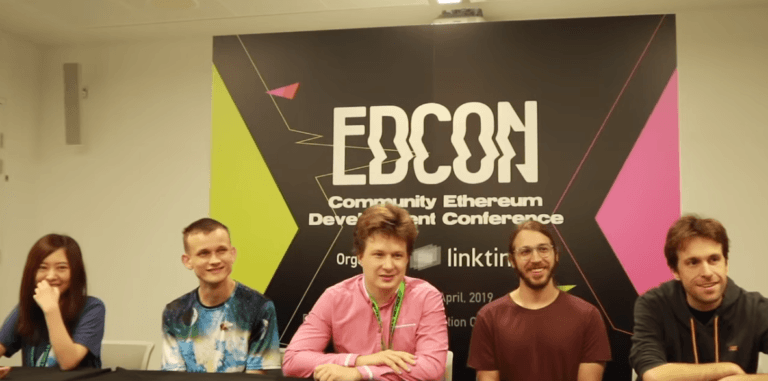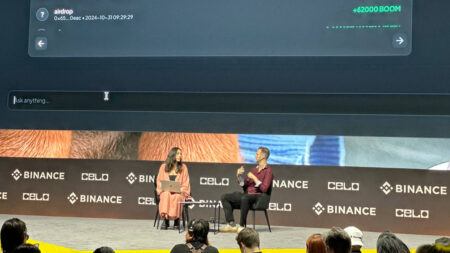On Friday (April 12), day two of the EDCON (Community Ethereum Development Conference) 2019 event in Sydney, Australia, Vitalik Buterin and four other members of the Ethereum Foundation—Hsiao-Wei Wang, Virgil Griffith, Danny Ryan, and Justin Drake—had some interesting things to say about Bitcoin (BTC), Bitcoin Cash (BCH), Ethereum (ETH), Ethereum Classic (ETC), Stellar (XLM), and TRON (TRX). Here are some of their most interesting comments from the interview.
Q: How much has the Ethereum roadmap changed?
Vitalik:
- “It’s changed a huge amount. The first version of proof-of-stake (PoS) I came up with that I published in January 2014, it actually technically was not even secure.”
- “Since then, we’ve just done a huge amount of research, rethinking, figuring out that proof-of-stake actually is possible.”
- “We spent years trying to make Casper FFG work… We’ve spent a long time trying to make sharding work on top of the existing Ethereum chain.”
Q: Why should people bring their attention back to Ethereum?
Vitalik:
- “There’s definitely been a reduction of interest in all blockchain projects, especially people who are just following cryptocurrencies for the price like stopped following them because the price stopped moving in a happy direction for a while.”
- “Right now, there’s more things to build with and build on top of than there ever has been before, and I expect there to be even more over the next few months. So, for a developer, the experience is becoming more and more interesting very quickly.”
Q: Is there a move toward more frequent hard forks with the 1.0 chain?
Danny:
- “There’s definitely a movement on the 1.0 chain to more frequent small hard forks; they’re just going to get into a rythm. There are a number of just smaller technical challenges they want to tackle.”
- “With respect to the Beacon chain and Eth 2.0, the approach right now is to move quickly and to, before we get to phase two, which is when all user activity comes in, move pretty rapidly and build up the core architecture. When you do have the user level activity… there’s a ton more maintenance on the system that you have to have and there’s just more political maneuvering to get changes.”
Q: What do you think about Justin Sun’s recent comment about working with Ethereum developers?
Virgil:
- “So, it’s news to us.”
- “The man is an incredible marketer. He’s incredible!… I would love to have him as Chief Marketing Officer for Ethereum… I wouldn’t make him CEO of my company, but CMO? Hell’s yeah!”
Q: Do you find it worrying that some projects are migrating to EOS, Stellar, and TRON?
Virgil:
- “I mean we don’t need to eat like everything.”
- “I actually advised someone a few months ago to actually go [to] Stellar instead of Ethereum. So, Ethereum sort of errs on the side of maximum flexibility. If you only want to send tokens around… just fungible tokens…I mean, we are kind of overkill. Yeah, so, if you just want to send tokens around really, really fast, you probably don’t need us, and that’s not offensive.”
Q: Thoughts on IEOs?
Vitalik:
“Basically… they seem just like ICOs, but more centralized.”
Q: What is your relationship with the Ethereum Classic team?
Virgil:
- “They have a bit more purist sensibilities, but they are not incompetent.”
- “When they publish software, you maybe bow… ‘Hey, that’s kind of handy! I’m really glad that’s compatible with us. Thanks, guys!'”
- “So, I guess their incompatibility is nice, and they occasionally make nice things.”
- “I do think Ethereum Classic would probably have a little more trouble as they get larger. In general, the larger you get, you have to get a little more pragmatic just because the real world impinges upon you more, and so, I’ll probably say they have a little bit more freedom to be ideologues because of their size.”
Q: What do you think about the value proposition of Bitcoin over the long term?
Danny:
- “The meme value of Bitcoin is very high… the store of value meme, the king of crypto meme… the gold thing.”
Vitalik:
- “Things I am watching — one of them is Bitcoin Cash. I mean, price-wise, it seems to have recovered a lot from its slump recently, but also technology-wise, it seems like they are beating Bitcoin to integrating Schnorr signatures, which was just super out-of-the-blue surprising.”
- “It’s like maybe two years ago you might have thought it’s just like jokers, but there seems to be real technical talent there.”









